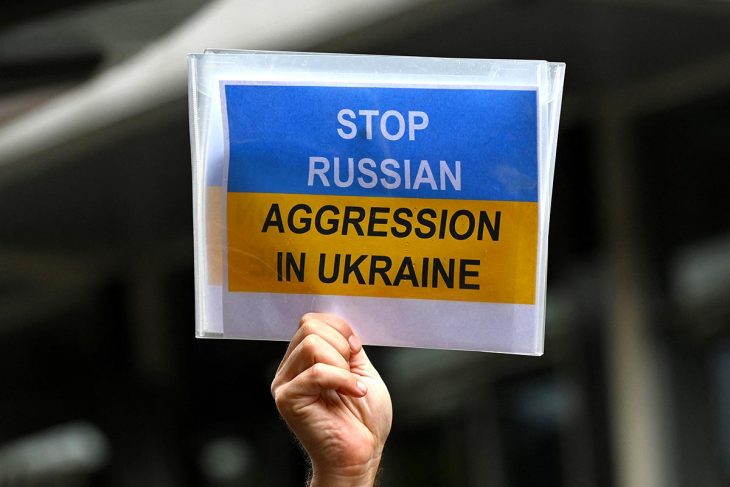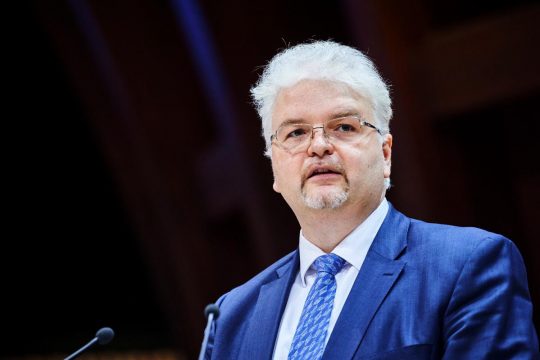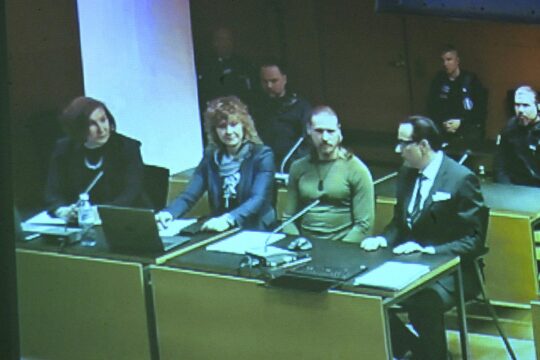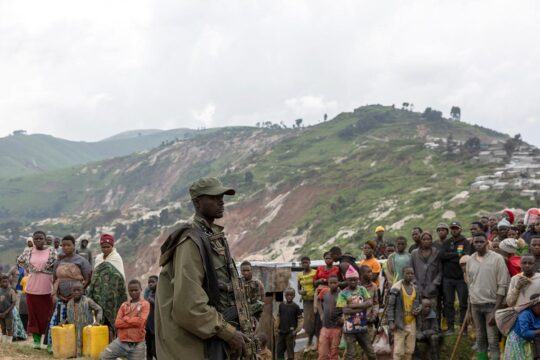Kostia Gorobets: What’s compelling and what’s practical
The crime of aggression is not very much a crime against particular people who are victims of war crimes, crimes against humanity, and genocide. It is primarily a crime against international law, against the prohibition of the use of force. From that point of view, it is of paramount importance that the prosecution and punishment of the crime of aggression is as international as possible. Because it's not only about Ukraine, it's not only about Ukrainians, it's about the whole world. It's about something that needs to be rebuilt from scratch because the only case when the crime of aggression was punished was the Nuremberg trials.
Many people in international law nowadays dismiss the Nuremberg trials as not an appropriate format. They instead kind of shift the focus on the contemporary forms [of international criminal justice] – for instance, the Special Court for Sierra Leone. This is wrong, because all these newer formats weren't about the crime of aggression at all. They were about crimes against humanity and war crimes, and these are different crimes. That is why the Nuremberg trials are the closest to what we might need. Of course, they were victor’s justice. That's a bad thing, obviously, for moral and political legitimacy. The mechanism for the creation of such a tribunal must therefore be totally different.
One trajectory is what we want to have; what would be the most appropriate, the most legitimate, the most compelling way of punishing this crime of aggression and preventing new crimes of aggression from happening. Another frame of thought or trajectory is how practically viable these solutions are or can be. I think we are just collapsing them into one another, and this is wrong. The design that we want to have, and its practical viability, are different things.
I think we are at this point when practical viability, although it is crucially important, is not as important yet. We are now in the unique moment when there is enough momentum or at least there seems to be enough of a momentum to change something or at least to try to change something. But this momentum is being bogged down because this is impractical. It is an important critique because whatever the format will be – and I am sure that at some point we will find some format that would work, that would satisfy all the parties – it should be morally and politically legitimate.
We need to differentiate the stages of our thinking about this tribunal for the crime of aggression because it is running in parallel with the prosecution of war crimes. We have the International Criminal Court (ICC) and the ICC has territorial jurisdiction. An alternative could be, of course, creating a super special tribunal with jurisdiction to cover both war crimes, possible crimes against humanity and the crime of aggression. But this alternative would be a dilution of efforts because we have the ICC that has jurisdiction [on war crimes and crimes against humanity]. Such doubling of functions would be, of course, a huge mistake.
Perhaps there is now this space for creating some model of an ad hoc tribunal specifically on the crime of aggression that could work in cooperation with the ICC. I find somewhat attractive the idea of creating it as a special chamber of the ICC, but I don't quite see how a special chamber of ICC could override the jurisdictional limitations of the mother institution [on the crime of aggression the ICC only has competence if both the aggressed state and the aggressor are ICC member states, and Russia is not]. So there are multiple streams here that could make such a tribunal attractive to a wider range of actors, even those who are trying to abstain from dealing with this conflict. I mean, if nothing is done now, how much longer do we have to wait?
Carrie McDougall: The galvanizing effect of an international tribunal
Aggression is, by definition, a leadership crime. I would imagine any prosecutor is going to be looking pretty seriously at Presidents Putin and Lukashenko. And then maybe the inner circle of defence and foreign ministers, at least in the first instance. The reality is that those individuals enjoy immunity before domestic courts. So I think it has to be international just because otherwise you leave yourself exposed to a successful claim to immunity.
What I've advocated is a model that would make it very clear there was no wanting to undermine the ICC. Any tribunal could conclude a relationship agreement, for example, just to underscore that it's meant to be complementary, and that the jurisdiction would also be limited to Ukraine. We do have a crime of aggression at the ICC. We do need to try and revise the Rome Statute provisions, because there's a built-in review clause of them seven years after entry into force. I hope this discussion actually has a galvanising effect of reminding everyone how important the prohibition of the use of force actually is to international peace and security and the international rules-based order.
The Nuremberg and Tokyo precedent is important because crimes against peace were really the centrepieces of those trials. It was all about those wars of aggression. When advocating for the establishment of an ad hoc tribunal, there are the immunity reasons, but also the legitimacy reasons. The broadest possible base of state support will strengthen your argument that it is a tribunal that's properly characterised as international. Now you can make an argument that it would be sufficiently international to have an exclusively European states established tribunal, that it is still a significant cross-section. But I think there's also good reason, including in terms of reinforcing commitment to the prohibition on the use of force, to have a cross-regional group of states. And I think the UN path should be tested. It's worth consulting and seeing if there would be sufficient support because that would be the clearest way of signalling international backing and that it is a truly international tribunal. But I’m just not sure that states would be ready to sign up for that. The US, the UK, France have always been nervous about the crime of aggression. I don't think they'll be leading proponents of any international tribunal, even if they sort of close their eyes and let it get established. There are also many other smaller states that worry about accountability generally. You know, the heydays of Rome [when the ICC was created, in 1998] are gone. So I think no one would want to put forward a resolution that attracted anything less than, I'd say, at least 100 votes.
People tend to overlook that the crime of aggression in many ways is about protecting state sovereignty, and that is a very valuable notion still in the current era. I think Russia has struck out against the international order and is trying to reshape the world as it would like to see it. And so, the wrong being committed is much broader than anything that would be captured by very important prosecutions for war crimes and crimes against humanity. In some ways, going back to Nuremberg, the harm done is quite different from the harm captured by other crimes.
Francine Hirsch: Why Nuremberg resonates
Nuremberg was a military tribunal that was held by the allied powers. It was held by the victors. It was understood as an extension of the war. I could imagine it being a model in terms of the historical record that it created, and I think that we're going to need something like that; a really extremely detailed record. With the amount of disinformation that is happening now within Russia, this is going to be essential for educating the Russian people about what happened. If there's an opportunity to have a trial, even if this is something that is held in absentia, I still think it would be a valuable exercise. It seems, I guess, premature. The most important reason to be talking about this right now is for the collection of evidence.
In [a recent] RIA Novosti article and many statements that Putin and his advisers have made, they're calling for a Nuremberg. They love the Nuremberg verdict in Russia because Russia was not tried for the crimes against peace and war crimes and crimes against humanity that it carried out. I mean, none of the allied powers were. But Russia likes it because it doesn't include the invasion of the Baltic states. It doesn't include the invasion of Poland. So should Ukraine win, there should be a Nuremberg-type tribunal. But if Russia wins, in the territory that Russia conquers they're going to be holding their own trials that they're going to say are based on Nuremberg. And the international community has to be ready for that and ready to respond to it.
Many [Russian] people think that they are fighting against the Nazis, that the Ukrainians are the inheritors of this Nazi tradition. And so when they're calling for a Nuremberg in Russia now – and they repeatedly are – they're calling for trials of Ukrainian leaders. I just see all of this coming down the line and it's really disturbing. It's a replay in many ways of things from the 1940s and they are twisting it. So, a Nuremberg model of justice, should Ukraine win the war? Fantastic. Especially for establishing the historical record.
Kevin Jon Heller: Doing what Ukraine wants
It's interesting that once again, the international community is trying to figure out how to approach accountability for aggression. The big thing about Nuremberg was, of course, that they really, very deliberately, wanted to establish the criminality of aggression and to hold the Nazis accountable for aggression, even though they were operating on a fairly blank slate. Now once again, we see the international community trying to develop these mechanisms, but not exactly working on a clean slate because of course, we have Nuremberg as the most important precedent.
The Nuremberg parallel is really important, too. The judges said that aggression is the supreme international crime; it is a crime that contains within itself all of the others. I think you can push that too far, but there still is a real grain of truth to that idea. It's not very common that one state invades another state and then, there's no bloodshed and no crimes committed. Normally, the invasion does lead to further atrocities. Obviously, that doesn't mean you don't prosecute the atrocities themselves. But there really is a very strong foundation to the argument that one of the reasons you criminalise aggression is precisely because of what it leads to or what follows from aggression. Why not cut it off at the source as opposed to just dealing with the aftermath?
I don't think there is any fundamental difference between any of the forms that have been discussed in terms of their ability to ignore immunity. I mean, I do buy the argument that at a minimum it needs to have some kind of international component. How much of an international element is enough? That is very uncertain.
Unfortunately, it probably does not reopen a discussion about aggression at the ICC. I don't think there's really any plausible way that we could ever really deal with aggression at the ICC. I wish that were true. But it's not an accident that non-state parties are excluded from their jurisdiction [on the crime of aggression]. And I can't imagine that everything will align any of the powerful states to fundamentally change the Rome Statute. Maybe I'm too pessimistic, but I think the smart money is on No, nothing will change.
All my arguments start from the fundamental premise that it is Ukraine that has to lead the accountability process and that ultimately the preference of scholars or the preferences of NGOs or even, frankly, the preferences of more powerful states should be subordinate to what the Ukrainians wants. And so, if the Ukrainians get on board with a mechanism that I don't necessarily think is the best one, that doesn't matter. I do think a hybrid tribunal has a lot of strengths but the best way to set back the cause of the long-term viability of aggression is to not ask that Ukraine, the direct victim of the aggression, be front and centre. The long-term interest in building Ukrainian judicial capacity is a very important one and even though aggression might be different to other crimes, it still would be the training and the expertise and all of that that would be flowing into Ukraine. So, I'm flexible in terms of the mechanism, but I think the more Ukraine's judiciary can be front and centre, the better.
What strikes me is that there is essentially no meat on the bones of the proposal for an international tribunal so far. In fact, no real guidance to what this tribunal would actually look like, who would support it, who would fund it, who would run it, who would choose the judges. Tribunals tend to be dominated by the powerful states and the idea that the U.S. or the UK would be a moving force behind that tribunal after the Iraq war strikes me as not a very good outcome for international criminal law.
Kateryna Busol: The attraction and pitfalls of a new Nuremberg
As an international lawyer, I'm not starry eyed about the [Nuremberg] International Military Tribunal or about the idea of the specialised tribunal. The existing Western commentaries on the possible modalities of a tribunal are based on disillusionment about Nuremberg. And they are based on the lack of understanding of the region, especially the post-Soviet context, and the fact that for Russia and for Ukraine, Nuremberg has a great symbolic value.
Nuremberg is usually perceived as the trial of all trials, the victory of the ultimate good over the ultimate evil. The Nuremberg model would have particular symbolism for Russia because we should think how the Russian society would accept the legacy of a potential trial of the Putin regime. For them to receive the indictments by a ‘contemporary Nuremberg’ would be a very strong incentive to reflect on their own memory policy, memory politics, because they have been idealised so much in this [post-World War Two] trial. Distorting the narrative about WWII and about the International Military Tribunal is criminalised under Russia's domestic legislation. So I think it would be a strong push for certain reflection; whether something that you have held so holy remains so holy, and whether you are ready to accept the legacy of potential contempt for a [21st century] ‘Nuremberg’ which concerns the crimes of your regime and the crimes in which you might be complicit as a wider society, because we know that the approval rating of Putin and his policies in Ukraine is rising amongst the ordinary Russians.
The international legal community, with a wealth of amazing analysis they have produced since February concerning Ukraine, could look a little bit more into the nuances of the country and of the region. Without this desire to dig deeper into the regional and domestic context, they will not get the full picture.
There is also certain idealism about international proceedings domestically in Ukraine because they really see this aggression as the encroachment on their own national identity and indeed their sovereign right, as a nation and as a state, to exist. They also see this as an encroachment on the wider world, international world order and the rule-based order. What I sense from the society, from the ordinary non-lawyers, from the journalists, is that they would prefer a special tribunal.But this symbolism, this comparison with Nuremberg would always be there.
Before this invasion, there had been a lot of domestic discussion about a possible hybrid tribunal in Ukraine. Domestic professionals stopped being that idealistic about the ICC - the experience of the ICC shows that to investigate and prosecute war crimes and crimes against humanity can take years and indeed decades – and they wanted more proceedings to take place domestically. They also saw that as a way to boost the expertise of domestic investigators, prosecutors, judges and defence lawyers. But that concerned the alleged war crimes and crimes against humanity perpetrated between 2014 and February 2022. Now, because the whole nation is so shattered by the level of violence, I think they really prefer something more international to send a strong message to the Russian society and to the world community that this is not an isolated incident concerning one nation, that this is an encroachment of the rule-based order, which we have been trying to build since 1945. It's also about building a narrative which is as inclusive as possible, and which is embraced by the future generations.








